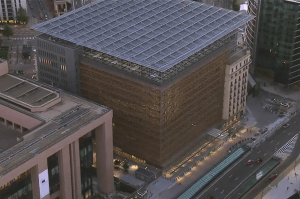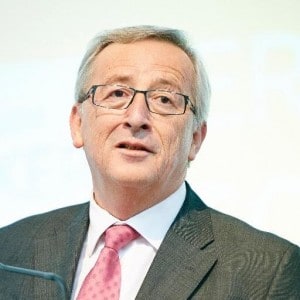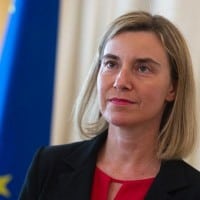Following a Brexit-dominated 2016, the European Union is seeking to shore up its image in 2017. Existential challenges lie ahead, but EU officials are proposing deeper integration of member states as a way to repair a fragmenting union.

To start the year, some EU officials are moving into the brand new, approximately $340 million Europa building in Brussels. The Europa building is the new home of the European Council and the Council of the European Union. The European Council is the body in which heads of member states convene together with EU executives, and the Council of the European Union is the agency consisting of national ministers.
According to Architectural Digest, the Europa building was initially expected to be completed in 2012 and cost $83 million less than its final price tag. However, EU officials boast the project won the special edition of the Chicago Athenaeum’s Green Good Design Award.
The Europa building consists of a lantern-shaped structure surrounded by a glass atrium. The design would seemingly signify transparency, but critics say the architecture is a case of bitter irony.
“It is a strange paradox: the building is full of windows but not transparent at all,” Marco Schmitt, an architect and neighborhood activist, told The Guardian last January. “The public won’t see anything of what goes on in there. Symbolic for the Council, which decides everything behind closed doors anyway.”

As for policy, European Commission President Jean-Claude Juncker’s team has released an outline of its key initiatives and political priorities for 2017. One of the political priorities is “a deeper and fairer economic and monetary union.”
Proponents of European integration say an economic and fiscal union is needed to resolve the ongoing crisis plaguing the eurozone, the EU’s monetary union.
“One of the main lessons of the crisis has been that fiscal policies are a matter of vital common interest in a monetary union,” Juncker stated in a 2015 report titled “Completing Europe’s Economic and Monetary Union.”
Fully integrating the EU states fiscally would entail creating a European treasury and transferring budgeting powers from national governments to Brussels. That idea is wildly unpopular to many, particularly in Southern Europe. But deficit spending and financial crises — the latest an Italian banking crisis — are a recurring problem in Southern Europe and have led to German taxpayers bailing out Greece. EU officials will likely continue trying to exploit the crises to further intertwine national budgets.
REFRESHER ON THE EURO CRISIS:
In the arena of foreign policy, Brussels too is calling for greater integration. Foreign policy chief Federica Mogherini is pushing the idea of a European defense union. Some EU officials have indicated they ultimately hope to create a European army with a central military budget and headquarters. However, current plans are fairly ambiguous, largely due to division within the EU. Some member states support greater integration of EU countries’ militaries, while others, particularly those that are neutral militarily, oppose the plan.

In addition to calling for greater integration, Brussels is still seeking to expand the European Union. In a New Year’s Day blog post, Mogherini declared, “The Balkans lie at the heart of Europe, their future is inside the European Union.”
To use a baseball analogy, the Balkans, particularly the Western Balkans, is the EU’s farm team. Most of the Western Balkan states linger in the minor leagues, while the perceived cream of the crop get to join the EU.
While Slovenia and Croatia are EU members, six Western Balkan states — Albania, Bosnia, Kosovo, Macedonia, Montenegro and Serbia — remain membership candidates or potential candidates. None of those six states are expected to join the EU this year or next year or even the year after. Montenegro probably has the best chance to join the EU, yet its membership negotiations began in 2012, and only 2 of 33 negotiating chapters have been provisionally closed.
Meanwhile, the UK is preparing for negotiations on leaving the EU. British politicians are delaying the process, but polls show Britons still favor leaving the union and would vote again to do so if a second Brexit referendum was called.
Depending on the results of upcoming national elections, more member states could be calling referenda on potentially leaving the EU.
Dutch politician Geert Wilders’ anti-EU party is polling neck and neck with the Netherlands’ ruling party. Parliamentary elections in the Netherlands are due to take place in March.
National Front leader Marine Le Pen is currently projected to advance to the runoff stage in this spring’s French presidential elections. Le Pen is not expected to win the French presidency, but it is conceivable she could. Le Pen has called for referenda on leaving the EU and the eurozone.
Germany, the EU’s dominant member state, is not at risk of leaving the union in the near future. But German Chancellor Angela Merkel, the EU’s most prominent figure, is at risk of losing power in elections due to take place this fall. Merkel has lost considerable popularity as a result of her handling of the migrant crisis. The right-wing Alternative For Deutschland is taking away votes from Merkel’s Christian Democrats, and Germany’s pro-Russian leftists stand to gain from the changing sentiments.
Elections are not scheduled to take place in Italy in 2017, but entering the year, the country has probably the most volatile financial and political outlook in the EU. Italian Prime Minister Matteo Renzi recently resigned following defeat in a national referendum, and Italy closed out the year with a multi-billion dollar bank bailout. If elections are called in 2017, the eurosceptic and anti-euro Five Star Movement would have an opportunity to seize power in Rome.
Mogherini, an Italian politician turned top EU diplomat, called 2016 “the toughest year in the history of European integration.” In 2017, Mogherini and her peers will strive for greater integration, but further disintegration is possible, if not likely.
